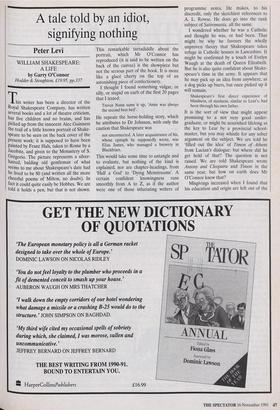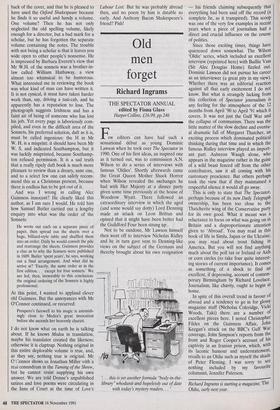A tale told by an idiot, signifying nothing
Peter Levi
WILLIAM SHAKESPEARE: A LIFE by Garry O'Connor Hodder dt Stoughton, £19.95, pp.337 his writer has been a director of the Royal Shakespeare Company, has written several books and a lot of theatre criticism, has five children and no brains, and has Picked up from the innocent Alec Guinness the trail of a little known portrait of Shake- speare to be seen on the back cover of the Present work; it is supposed to have been Painted by Franz HaIs, taken to Rome by a Jacobite, and given to the Monastery of S. Gregorio. The picture represents a silver- haired, balding old gentleman of what seems to me about Shakespeare's date had he lived to be 80 (and written all the more Cheerful poems of Milton, no doubt). In fact it could quite easily be Hobbes. We are told it holds a pen, but that is not shown.
This remarkable tarradiddle about the portrait, which Mr O'Connor has reproduced (it is said to be written on the back of the canvas) is the showpiece but not the serious part of the book. It is more like a glace cherry on the top of an astonishing piece of confectionery.
I thought I found something vulgar, or silly, or stupid on each of the first 20 pages that I tested:
Trevor Nunn sums it up, 'Anne was always the second best bed'.
He repeats the horse-holding story, which he attributes to Dr Johnson, with only the caution that Shakespeare was
not unconnected. A later acquaintance of his, whose epitaph he supposedly wrote, was Elias James, who managed a brewery in Blackfriars.
This would take some time to untangle and to evaluate, but nothing of the kind is explained, nor are chapter-headings, from 'Half a God' to 'Dying Menstruums'. A certain confident knowingness runs smoothly from A to Z, as if the author were one of those infuriating writers of programme notes. He makes, to his discredit, only the sketchiest references to A. L. Rowse. He does go into the rank subject of Satiromastix, all the same.
I wondered whether he was a Catholic and thought he was, or had been. That might be why he favours the wholly unproven theory that Shakespeare takes refuge in Catholic houses in Lancashire. It might be confirmed by a touch of Evelyn Waugh at the death of Queen Elizabeth. But he is also quite confident about Shake- speare's time in the army. It appears that he may pick up an idea from anywhere, as a dog picks up burrs, but once picked up it will remain.
Shakespeare's first direct experience of blindness, of madness, similar to Lear's, had been through his own father.
It is the sort of view that might appear promising to a not very good under- graduate, or might be nourished lifelong as the key to Lear by a provincial school- master, but you may whistle for any sober argument on the subject. We are told he 'filled out the idea' of Timon of Athens from Lucian's dialogue: but where did he get hold of that? The question is not raised. We are told Shakespeare wrote Antony and Cleopatra and Timon in the same year, but how on earth does Mr O'Connor know that?
Misgivings increased when I found that his education and origin are left out of the back of the cover, and that he is pleased to have used the Oxford Shakespeare because he finds it so useful and handy a volume. One volume? Then he has not only neglected the old spelling volume, likely enough for a director, but a bad mark for a scholar, but he has forgotten the separate volume containing the notes. The trouble with not being a scholar is that it leaves you wide open to other people's nonsense. He is impressed by Barbara Everett's view that Mr W.H. of the sonnets was a brother-in- law called William Hathaway, a view almost too whimsical to be humorous. What interested me in reviewing the book was what kind of man can have written it. It is not cynical, it must have taken harder work than, say, driving a taxi-cab, and he apparently has a reputation to lose. The photograph suggests Irishness and has a faint air of being of someone who has lost his job. Yet every page is laboriously com- piled, and even in the difficult area of the Sonnets, his preferred solution, daft as it is, must be called ingenious: the H in Mr W. H. is a misprint: it should have been Mr W. S. and indicated Southampton, but it was luckily misprinted, because Southamp- ton refused permission. It is a sad truth that a really ripely daft book is much more pleasure to review than a dreary, sane one, and to a select few one can safely recom- mend this as a Christmas present, because there is endless fun to be got out of it.
And was I wrong in calling Alec Guinness innocent? He clearly liked this author, as I am sure I would. He told him how Samuel Butler carried out a lengthy enquiry into what was the order of the Sonnets:
He wrote out each on a separate piece of paper, then spread out the sheets over a huge, billiard-style table and shuffled them into an order. Daily he would consult the pile and rearrange the sheets. Guinness provides a clue as to why the Sonnets were published in 1609. Butler 'spent years', he says, working Out a final arrangement. And what did he arrive at? 'Exactly, the same order as in the first edition... except for four sonnets.' We are led, then, inexorably to this conclusion: the original ordering of the Sonnets is highly professional.
At this point, I wanted to applaud clever old Guinness. But the annoyances with Mr O'Connor continued, or recurred:
Prospero's farewell to his magic is astonish- ingly close to Medea's great invocation before she ascends her heavenly chariot.
I do not know what on earth he is talking about. If he knows Medea in translation, Maybe his translator created the likeness; otherwise it is claptrap. Nothing original in this entire deplorable volume is true, and, as they say, nothing true is original. Mr O'Connor shows us Jonathan Miller with a real conundrum in the Taming of the Shrew, but he cannot resist supplying his own answer. We are told Donne's unpublished satires and love poems were circulating in the Inns of Court at the time of Love's
Labour Lost. But he was probably abroad then, and no poem by him is datable so early. And Anthony Bacon Shakespeare's friend? Pish!











































































 Previous page
Previous page